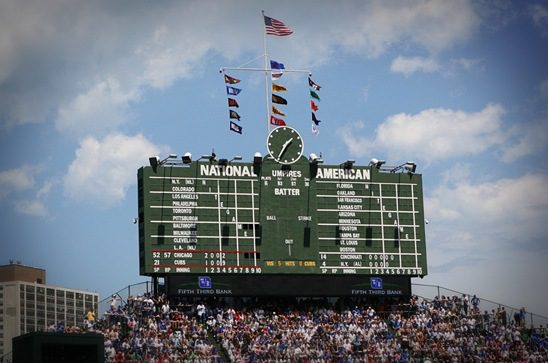
 In many ways, Chicago Cubs fans are inherently attached to Wrigley Field as both a historic icon and a nostalgic symbol of Chicago’s past. But what makes Wrigley Field unique is its location in relation to its physical environment.
In many ways, Chicago Cubs fans are inherently attached to Wrigley Field as both a historic icon and a nostalgic symbol of Chicago’s past. But what makes Wrigley Field unique is its location in relation to its physical environment.
It is well known fact that Wrigley Field is one of the toughest ballparks in the country to play in. And it has nothing to do with the Ivy wall, the distance from home plate to the outer most wall or the Chicago baseball fans. Wrigley is a tough nut to crack because of the weather that affects the Chicago area.
Wrigley field is located within walking distance of Lake Michigan, which is but one lake in the biggest inland water system on the planet: The Great Lakes. This inland freshwater system contains approximately 22 percent of the world’s fresh water, and its combined surface area is approximately 5000 cubic miles.
The Great Lakes are so big, they produce their own weather systems and swallow ships whole without a trace. But in reality, what does it have to do with Wrigley Field baseball? The truth: Just about everything.
Weather patterns, humidity levels and wind direction at Wrigley can all contribute to how an airborne baseball behaves at Wrigley. Former manager Lou Pinella commented on the environmental variables and noted that Wrigley was a special stadium to play in because of the weather and wind patterns. Wrigley Field is one of the few parks in the world where fans can tell whether it’s going to be a high-scoring game or pitcher’s duel by looking at the flags flying over the scoreboard in center field. A harmless fly ball can be a home run one day and routine pop-up depending on which direction the flags are blowing.
WGN radio broadcaster Pat Hughes is always quick to mention the weather as it enters Wrigley field, and WGN listeners can mark certain games by how they were affected by rain, fog, thunderstorms with screaming winds that rip through the windy city and through Wrigley Field. The early part of the 2011 baseball season is an example to the Wrigley weather, as everything from heavy rain, severe “rolling fog” off Lake Michigan and extreme cold have hit the friendly confines this season.
So, next time a baseball sails out of the park onto Waveland Ave, we’ll know it was because of more than just a silly bat hitting it.





